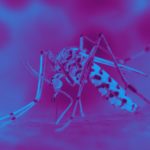Lien vers Pubmed [PMID] – 30745277
Lancet Infect Dis 2019 Feb;
BACKGROUND: A meningococcal group A conjugate vaccine, PsA-TT (also known as MenAfriVac), was developed with the support of the Meningitis Vaccine Project. Around 280 million individuals aged 1-29 years have been immunised across the African meningitis belt. We analysed the kinetics of vaccine-induced antibody response and assessed the possible implications for duration of protection.
METHODS: We obtained data from two longitudinal studies done in The Gambia, Mali, and Senegal of antibody responses in 193 children aged 12-23 months and 604 participants aged 2-29 years following MenAfriVac vaccination. Antibodies were measured using two methods: group A serum bactericidal antibody (SBA) assay and group A-specific IgG ELISA. Data on antibody responses were analysed using a mixed-effects statistical model accounting for the mean response and variation in patterns of antibody kinetics. Determinants of antibody duration were investigated using regression analysis.
FINDINGS: In children age 12-23 months, the reduction in MenAfriVac-induced antibody levels assessed by SBA titres had two phases: with 97·0% (95% credible interval [CrI] 95·1-98·3) of the response being short lived and decaying within the first 6 months and the remainder being long lived and decaying with a half-life of 2690 days (95% CrI 1016-15 078). Antibody levels assessed by SBA titres in participants aged 2-29 years were more persistent, with 95·0% (85·7-98·1) of the response being short lived, and the long lived phase decaying with a half-life of 6007 days (95% CrI 2826-14 279). Greater pre-vaccination antibody levels were associated with greater immunogenicity following vaccination, as well as greater antibody persistence. Despite rapid antibody declines in the first phase, antibodies in the second phase persisted at SBA titres greater than 128. Although there is no strong evidence base for a correlate of protection against infection with Neisseria meningitidis serogroup A, we use an assumed SBA titre of 128 as a threshold of protection to predict that 20 years after vaccination with a single dose of MenAfriVac, vaccine efficacy will be 52% (29-73) in children vaccinated at age 12-23 months and 70% (60-79) in participants vaccinated at age 2-29 years.
INTERPRETATION: Population-level immunity induced by routine vaccination with the Expanded Programme on Immunization is predicted to persist at levels sufficient to confer more than 50% protection over a 20-year time period. Further increases in population-level immunity could be obtained via mass campaigns or by delaying the age of vaccination through the Expanded Programme on Immunization. However, the benefits of such a strategy would need to be weighed against the risks of leaving young children unvaccinated for longer.
FUNDING: Meningitis Vaccine Project and Institut Pasteur.

